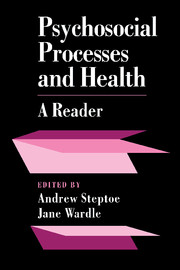Book contents
- Frontmatter
- Contents
- Preface
- Section 1 Life stress, social support and health
- Section 2 Psychophysiological processes in disease
- Section 3 Personality, behaviour patterns and health
- Section 4 Health practices and the modification of health risk behaviour
- Section 5 Coping with illness and disability
- Active coping processes, coping dispositions, and recovery from surgery
- The impact of denial and repressive style on information gain and rehabilitation outcomes in myocardial infarction patients
- Reduction of postoperative pain by encouragement and instruction of patients: a study of doctor-patient rapport
- Psychological response to breast cancer: effect on outcome
- The effects of choice and enhanced personal responsibility for the aged: a field experiment in an institutional setting
- Section 6 Behavioural interventions in medicine
- Index
The impact of denial and repressive style on information gain and rehabilitation outcomes in myocardial infarction patients
from Section 5 - Coping with illness and disability
Published online by Cambridge University Press: 05 August 2016
- Frontmatter
- Contents
- Preface
- Section 1 Life stress, social support and health
- Section 2 Psychophysiological processes in disease
- Section 3 Personality, behaviour patterns and health
- Section 4 Health practices and the modification of health risk behaviour
- Section 5 Coping with illness and disability
- Active coping processes, coping dispositions, and recovery from surgery
- The impact of denial and repressive style on information gain and rehabilitation outcomes in myocardial infarction patients
- Reduction of postoperative pain by encouragement and instruction of patients: a study of doctor-patient rapport
- Psychological response to breast cancer: effect on outcome
- The effects of choice and enhanced personal responsibility for the aged: a field experiment in an institutional setting
- Section 6 Behavioural interventions in medicine
- Index
Summary
Abstract
The impact of denial, repressive style, and social desirability on information gained during hospitalization and their effects on recovery were studied in 30 patients with documented myocardial infarction (MI). Using three scores of cardiac knowledge as dependent variables, three significant findings emerged: 1) patients who denied more gained less information about heart anatomy and physiology; 2) patients who scored high on social desirability gained less information about systems indicating heart problems and activities appropriate for recovery; and 3) patients who were repressors gained less information about heart disease risk factors. Twenty-four of the 30 patients completed a survey of functioning 6 months after discharge. Dividing patients into four groups representing a match or mismatch between repressive style and information level, it was found that 1) repressors with high risk factor information reported more complications and poorer psychomedical functioning, and 2) sensitizers with low risk factor information reported poorer social functioning.
Introduction
Cardiac rehabilitation in the form of patient education has become an integral part of treatment during hospitalization for patients recovering from a heart attack. Although it is well established that cardiac education programs lead to significant gain in knowledge about rehabilitation (1-3), the impact of information gained on subsequent recovery from myocardial infarction (MI) remains unclear. Some studies have demonstrated that higher levels of information lead to minimal or even negative effects on the recovery process (4-6), whereas others have shown that the amount of information gained during cardiac education is positively related to compliance with diet and drug regimens, reduced readmission to the hospital (7), and increased return to work and decreased smoking (8). The findings of one study suggest that the crucial factor is not merely the level of information, but rather the combination of information and other rehabilitation factors. Cromwell et al. (6) randomly assigned patients admitted to the Coronary Care Unit into groups in which the amount of information, the level of outside stimulation, and the extent to which patients were allowed to participate in their own treatment were all experimentally controlled. They found that patients who experienced high levels of information and were allowed to engage in activities to help themselves but who also had low levels of stimulation and diversion spent the fewest days in the CCU and had the shortest total hospital stay.
- Type
- Chapter
- Information
- Psychosocial Processes and HealthA Reader, pp. 369 - 385Publisher: Cambridge University PressPrint publication year: 1994



